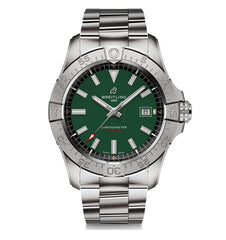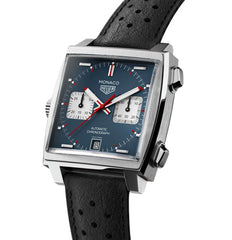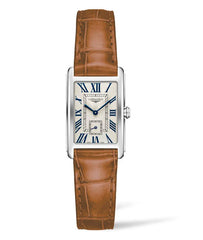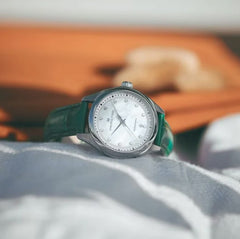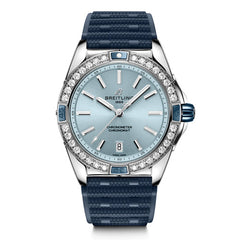A timepiece is often a cherished item. Whether it was passed down as an heirloom, given as a celebratory gift, or serves as a well-deserved purchase for yourself, they’re a special accessory. From high-end to modestly priced watches, routine services and the occasional watch repairs will help ensure all types of watches stay in the best shape possible. While top luxury timepieces are crafted to last a lifetime, proper care and maintenance will help prolong their beauty and functionality. We’ve put together a helpful guide to walk you through the importance of caring for your timepiece. We’ll help you recognize the signs that your watch requires immediate watch repair and guide you through what to expect from routine services.
- Why is Professional Watch Service Necessary?
- The Risks of Home Watch Repair and Maintenance
- What Does a Standard Watch Service Entail?
- Additional Watch Services Offered
- Steps Taken During a Thorough Watch Inspection
- Anticipate Watch Repair Needs by Being Proactive
- Common Watch Repair Needs for Automatic Watches
- Dial Watch Repairs
- Fink's Watch Repairs and Services
- Top Tips for Prolonging the Life of Your Watch
- Helpful Tips for General Cleaning
- Top Things to Avoid to Prolong the Life of Your Watch
Why is Professional Watch Service Necessary?

Watch repairs and services should be entrusted to professionally trained jewelers to ensure any type of watch issue is adequately addressed. Luxury timepieces in particular should never be left in the hands of amateurs to repair, clean, or inspect. The movements on these luxury timepieces require proper equipment, expertise, and a steady hand. Many luxury brands require their own rigorous training and certification before authorizing someone as the brand’s recognized repair representative.
A licensed professional is prepared to handle the routine inspection, cleaning, and maintenance of your watch or any other type of watch. Regularly scheduled checkups and proper watch repair when needs arise can help save you from additional costly damages that may occur. Taking care of your timepiece is essential and will help maintain its optimal performance and beauty. Professionally trained horologists have the eye and experience for addressing various issues, from preventative care to complex watch repairs, including:
- the wear of hinge pins
- daily exposure to various elements
- proper sealing against moisture
- value preservation
- accurate movement and timing
Recognizing Worn Hinge Pins
Many designer watches, such as TAG Heuer, Longines, and Cartier timepieces, and other types of watches boast stunning bracelet style bands. While they serve their purpose of keeping accurate time and gracing your wrist, how often do you think to check the integrity of their hinge pins? Most luxury brand wearers will likely admit to relying solely on routine service appointments. Even the most trusted brands can eventually experience worn hinge pins due to everyday use. Keeping up with routine service inspections of your treasured timepiece can catch and address weakened and damaged bracelet pins. If they are left unattended, worn watch pins could potentially result in the loss of or damage to your timepiece. Allowing a professional eye to inspect the ins and outs of your watch will help protect its integrity and offer you peace of mind.
Daily Exposure to Various Elements
Every day, we expose our watches to soaps, lotions, fragrances, and pollutants. Sweat and dirt become embedded in and around the casing of watches and bands regularly. The constant exposure to various elements can lead to excessive wear on any type of watch. Professional watch services can strategically clean and care for your watch case and band with gentle cleaners to help preserve its value and beauty.
Proper Sealing for Moisture Protection

Whether you purchase a waterproof or water-resistant timepiece, professional, routine servicing will ensure your watch remains intact. The slightest crack or improperly sealed gasket can allow moisture in and cause damage to the inner workings of any type of watch. A professional watch repair and inspection service will test the integrity of your seals and properly replace and reseal it after a full cleaning and watch repairs have been made. Each time your watch is opened for any reason, it should undergo moisture testing to ensure manufacturer standards are not compromised. This process is necessary to protect your timepiece from accidental water exposure and to guard against prolonged exposure to moisture from the air.
Keep in mind, there are varying degrees of water resistance across all types of watches. It is vital to remember that all types of watches must be serviced regularly to help ensure their water-resistance stands. As with anything, seals and gaskets deteriorate over time, requiring replacement according to the manufacturer guidelines to properly seal and protect the type of watch you own.
Preserve the Value of Your Timepiece
While many luxury timepieces can be a significant investment, professional routine maintenance can help preserve and even increase their values. From Cartier to TAG Heuer watches, you’re paying for the impeccable quality of materials and the expert craftsmanship that goes into the design and creation of your watch. Just as you would a car, scheduling services and watch repairs with a professional will protect your investment.
When proper care is given by you and professionally trained luxury watch repair experts, the traditional depreciation of such an investment does not apply. It is not uncommon to hear of luxury brands, including designer watches, appreciating over time. Professionals are trained to preserve the look and function of your watch. Professionally trained jewelers know what to look for, test for, and how to resolve issues within your timepiece.
Maintain Accurate Movement and Timing
For some, the type of watch that graces your wrist may simply be a means for accessorizing. For others, the type of watch you choose may symbolize status, a celebration, or a memorable heirloom. One thing is certain – your timepiece is meant to be a functional keeper of time. Whether you wear your TUDOR watch daily, store your Breitling except on special occasions, or keep your designer Swiss watch tucked away in a collection, all types of watches require regular professional service. Proper care and attention to routine services will keep them running accurately, even if watch repairs don’t seem to be necessary. It’s simply not enough to keep your luxury timepieces tucked safely away. They must be adequately cleaned, oiled, and inspected to ensure they maintain optimal movement and timing.
The Risks of Home Watch Repair and Maintenance
We realize there may be a handful of maintenance and watch repair tasks you feel can be handled at home. While some tasks may seem easy enough for many types of watches, we urge you to reconsider before taking them on yourself. A battery replacement may seem harmless, but keep in mind, the slightest slip or speck of dust can cause accidental damage to a watch’s delicate makeup. In the end, you may shell out much more in repairs than you had planned to spend on a battery swap. Here are just a few reasons we highly recommend seeking professional timepiece services and watch repairs:
Intricate Pieces and Many Moving Parts

Did you know there are up to five hundred moving pieces working together to keep that magnificent piece upon your wrist working correctly? While it may not seem like it, it is essential to have a professional perform even the simplest of repairs on all types of watches. Without the proper training and equipment, the slightest misalignment of any one piece may upset the entire inner workings of your watch.
Ideal Watch Repair Environment
An ideal watch repair environment is kept immaculate to ensure the integrity of your timepiece. A well-lit, dust-free environment is vital to avoid dust particles settling into the movement of any type of watch. No matter how much you’ve invested consider how sterile your home or office space truly is before you attempt even the most minor maneuver.
Voiding Your Warranty
Another critical aspect we’d like you to be aware of is your watch’s warranty. Chances are that the type of watch you purchased came with a warranty that will become void if home watch repairs or maintenance are attempted. This is reason enough to leave your checkups and watch repairs to the professionals.
Accidental Watch Repair Damage Can Be Costly
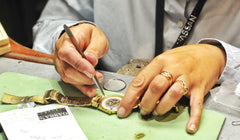
With hundreds of tiny parts working together, the slightest miscalculation or loss of a spring can be detrimental. Even with the best intentions, your DIY watch repair or maintenance attempts could cost you more time and money in the end. Keep in mind—there are reasons why various types of watch brands like Cartier watches train their jewelers, vet the watch repair locations they recommend, and use their own specified instruments.
What Does a Standard Watch Service Entail?
Most types of watches will come with a recommended service and maintenance schedule. While scheduling intervals will depend upon your type of watch and brand, the most common services performed include:
- bracelet or leather strap replacement
- watch winding and servicing
- link removal or replacement
- battery replacement and installation
Additional Watch Services Offered
Most types of watch maintenance services will also include cleaning, polishing, and re-oiling. Ensuring your pins are secure and well lubricated will help prevent additional wear, especially with metal bracelet styles. Your jeweler will also take this time to thoroughly inspect your watch for any signs of concern, including cracks to the face, moisture, or issues with movement.
A highly skilled watchmaker will disassemble your timepiece to inspect its inner workings. While this may equate to additional time apart from your watch, it will be returned to you in its original working condition. While disassembled, your jeweler will decipher any concerns and watch repairs that need to be made.
Steps Taken During a Thorough Watch Inspection
While different types of watches may require their own set of processes, we’ve compiled a list of the most common steps taken during a thorough watch inspection:
- During a routine service or minor watch repair, unique formulas are used to delicately clean the inner and outer casings of your watch.
- To avoid friction, the inner mechanism of your timepiece is specially lubricated. This lubrication process helps ensure your watch continues to keep time correctly.
- The balance wheel will be tested to ensure accuracy. This portion of the process requires repeat testing and may take several days for luxury brands.
- Upon complete inspection, the mechanism will be reassembled. The jeweler will replace the watch seals and strap.
- Your timepiece will undergo meticulous waterproof testing at this time.
- Lastly, a final inspection of your watch will be performed before it is returned to you.
Anticipate Watch Repair Needs by Being Proactive
You can help promote the longevity of your watch by being proactive. Keep an eye out for chips or cracks that may lead to moisture seeping into the face. Check your clasp occasionally to ensure it is secure. If you should have any concerns, no matter how small, it’s best to schedule an appointment to address possible needs. Being proactive could help you avoid the need for significant watch repairs should an issue worsen. The most common watch repairs include:
- crystal replacement due to cracks or chips
- clasp repairs or replacement
- watch is running slow or fast
- second hand is skipping or stuck
- the watch has stopped, even after a recent battery replacement
Common Watch Repair Needs for Automatic Watches
Investing in a luxury timepiece like a magnificent TAG Heuer watch or a water-resistant TAG Heuer Monaco Calibre 11 certainly offers reliability, durability, and longevity. Yet, it doesn’t mean you are guaranteed immunity from the everyday stressors and elements all types of watches are exposed to. Even the finest of automatic watches can still be prone to dents, rust, or magnetization. Some of the most common watch repair needs stem from mechanical movement and include issues with:
- movement
- timing
- dial
Movement Watch Repairs
You may require watch repair if you drop or forcefully bump any type of watch. The rough jolts can cause your watch to stop running due to breaking an axle of one or more wheels. The most common watch repair needed after a rough fall or bump is fixing the broken balance staff. Your watch’s balance staff will require replacement, along with a thorough inspection to ensure no additional damage was caused to the movement or timing or cracks to the face that may cause moisture to enter the watch.
Automatic or self-winding types of watches require your movement to wind fully. If your automatic type of watch has stopped running yet you are wearing it consistently, staying active, and building up sufficient power for it to run, it is time to schedule a watch repair. This particular movement issue may stem from a worn mainspring. Although rare, it requires attention and replacement by a highly trained watch repair expert, followed by a complete inspection and testing.
Timing Watch Repairs
Timing issues require the attention and touch of a skilled jeweler. Watch repairs for timing issues may include:
- watch is running slow
- watch is running fast
- watch will not stop winding
Watch is Running Slow

Your automatic watch is designed to run for roughly thirty-six hours after removal once fully wound. The winding may be manual winding at its crown or could happen by wearing the watch long enough to wind its mainspring fully. If you begin to notice your watch running slow or stopping, a watch repair is needed. While it may be a matter of replacing lubrication, it could indicate a more serious issue. It's essential to take your automatic type of watch in for inspection to ensure optimal performance.
Watch is Running Fast
If you notice your timepiece has been running fast, there could be one of several issues causing this. All require proper attention and watch repair service and include:
- lubrication of the hairspring
- hairspring is misaligned
- magnetization
Lubrication of the Hairspring
Your watch may run fast if there is an issue with its balance spring or hairspring. The hairspring is attached to the balance wheel and controls the speed of the wheels, setting the hands’ rate of movement. Internal lubricants within any type of watch movement may find their way to the hairspring, causing it to stick.
Misalignment of the Hairspring
If you have recently dropped your watch or it has taken a pretty hard hit, the hairspring may have been knocked out of alignment. This misalignment may not be the only issue from a rough jostle, so your watch should be thoroughly inspected for additional damage.
Watch Exposed to Magnetization
If your watch has been exposed to a magnetic field and is running fast, it may have become magnetized. Proper equipment can demagnetize your timepiece safely, so schedule a watch repair appointment.
When I Wind My Watch, It Doesn’t Stop Winding
If this sounds familiar, it may indicate you have a broken mainspring. This issue is more likely to happen in your manual-wind types of watches. The mainspring will require professional watch repair, including replacement and thorough maintenance, inspection, and testing. Automatic watches utilize a mainspring with a bridle that allows it to slip into the barrel. This design helps prevent the spring from being overly wound but does not guarantee you won’t need servicing or repairs.
Dial Watch Repairs
It’s also wise to schedule a watch repair if you experience issues with the chronograph hands. Sometimes, they must be manually reset by a professional if the second hand no longer sets back to the twelve o'clock position. A watch repair visit will adjust your hands and have your watch back in working order.
If you begin to notice the crystal face is fogging up, preventing you from viewing your watch dial, it is likely your watch was exposed to moisture. Take your watch in for repairs immediately, as this may mean one of two issues:
- The internal gaskets responsible for keeping your watch water-resistant require replacement.
- The crown of your watch may not have been appropriately sealed, and moisture has crept in.
During your watch repair, the crown, crystal, and back gasket will be replaced, followed by a thorough inspection and series of testing.
Fink's Watch Repairs and Services

At Fink's Jewelers, we have a skilled repair specialist on location in many of our stores. Our certified watch repair experts provide routine, preventative services and watch repairs for all your treasured Swiss-made timepieces. We know your luxury timepiece is priceless, so we are more than happy to provide you with inspections, cleanings, and watch repairs, regardless of where you purchased it. Our Fink’s timepiece experts will help you with any type of watch repair or service, including:
- battery changes
- polishing, cleaning, and lubricating
- removing, adding, and inspecting watch links
- repairing or replacing clasps
- performing certified manufacturer's warranty repairs on Swiss watches and other luxury brands
At Fink’s Jewelers, you can expect unmatched service, exceptional quality, and extensive timepiece knowledge. Our highly trained team is committed to caring for your timepiece as if it were their own and guarantees our watch repair services.
The Fink’s Guarantee
Our family-owned business continues to stand behind our belief in integrity and quality. You’ll find our watch repair specialists are knowledgeable, experienced, and ready to address any type of watch questions and needs you may have. In the unlikely event that you are not completely satisfied with your watch repair, we urge you to return with your watch concerns any time within a year of your visit.
Leaders in Designer Watch Repair
Trusting your luxury timepiece with anyone can be a bit scary. We understand your concerns and want you to feel confident about our exceptional work and raised standards. Whether your timepiece was purchased at Fink’s or not, we encourage you to bring your watch in and speak with one of our watch repair specialists.
What You Can Expect from Fink’s Watch Repairs and Services
Our watch services include a meticulous inspection to ensure we uncover and address all issues. Our experts will contact you and provide a complete report of all findings, repairs, and recommendations, along with time and pricing estimates. There are no surprises with Fink’s watch repairs, as each estimate will include materials, labor, and shipping options if necessary. We can also work with you to accommodate any expedited timeframes you may require, whenever possible.
Top Tips for Prolonging the Life of Your Watch
We want to help you minimize the wear of your designer watch and the need for watch repairs. Our team of experts has put together a list of tips and reminders to guide you through optimal care for your watch:

Keep your watch protected from dust and other potential damage by storing it in the original watch box. Alternatively, you can provide protection by storing it in a flannel jewelry pouch or high-quality, lined jewelry box.
Avoid placing any type of watch on its face or side. Proper positioning helps avoid scuffs and scratches, particularly to the crystal of your luxury watches.
If you’ve noticed a slight rattling from your timepiece, it’s best to seek a watch repair expert immediately. All types of watches have hundreds of essential components that rely on one another to keep your watch in optimal working order. Sometimes, the slightest bump or drop can loosen a spring or cause misalignment, even in the strongest of timepieces.
Different types of watches have various water-resistant limitations. Get to know your watch’s specific water-resistant features and limitations. It’s also important to understand that a water-resistant feature requires regular inspection, maintenance, and replacement to ensure seals and gaskets are secure.
At the first sign of moisture inside the face of any type of watch, you must schedule a watch repair. If your watch does sustain water damage, immediate action can help prevent rust, corrosion, and further damage. The sooner your timepiece is professionally opened, aired, and inspected, the less damage could be sustained. Saltwater can be particularly harmful to any type of watch. Handy trick: the natural warmth of your wrist can help dry the mechanism until you reach a watch repair expert, so keep it on if possible.
If you’re traveling, we recommend being selective about where and when you wear your timepiece. Accidental damage, particularly water damage, could dampen your plans. Consider leaving your watch at the hotel if you’re venturing out for an afternoon of higher-risk situations, such as the beach, poolside, or sporting activities if you don’t absolutely need it. If you’ll be using your watch on your adventures, it’s always a good idea to take it in for a quick inspection before your trip. They'll check for worn pins, loose screws and ensure water resistance for your peace of mind.
If you choose to swim with your water-resistant watch, here are a few helpful guidelines that will keep your timepiece safe.
Swimming with a Timepiece

- Ensure the crown is pushed down securely or screwed in tightly before entering the water to avoid any moisture entering the watch.
- Refrain from adjusting the crown or any push buttons on your watch while in a moist environment. Doing so could allow moisture to seep into its case.
- If you’re swimming in chlorinated or saltwater, proper attention is necessary to keep your timepiece in top shape. Clean your watch with fresh water and dry it thoroughly with a soft cloth after swimming.
- Many types of watches have a rotating bezel. Unfortunately, it's an excellent place for debris to hide. After your swim, rotate the bezel as you clean it to remove any lodged salt or sand.
Helpful Tips for General Cleaning of a Timepiece
There are general cleaning actions you can take to help keep your timepiece looking and working its best. Routine cleaning measures on your part can help prevent dirt, sweat, and lotions from seeping inside to cause damage. Use a gentle, dry cloth to wipe away dust, moisture, and perspiration for types of watches that are not water-resistant. If your watch is water-resistant, you can use a damp cloth on the head and a soft toothbrush with mild soap for bracelet bands. Be sure to dry completely.
Top Things to Avoid to Prolong the Life of Your Watch
When possible, try to avoid extreme temperatures, as they can impact certain types of watches that aren’t designed to withstand harsh weather. Exposure to moisture and drastic changes in temperature above 60°C/140°F and below 0°C/32°F may have a significant impact on the timekeeping and water resistance of most types of watches.
Harsh chemicals should be avoided with any type of watch. While many don’t realize it, this even includes direct contact with your cosmetics and body lotions or oils. Avoid direct contact with colognes and perfumes, solvents, and detergents to avoid damage to the case, gaskets, and band, whether leather or metal.
At Fink’s Jewelers, our team of dedicated jewelry and watch experts is here to help you preserve your precious timepiece. Don’t wait until it’s too late—give your type of watch the regular maintenance it requires.





